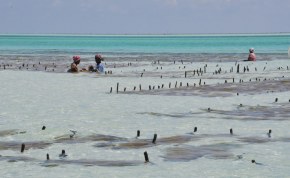
On a global level, climate change could slash crop yields and increase reliance on irrigation in the 2030s, but in some regions, including Southern Africa, agricultural output could increase and farming become less dependent on water, according to a study published last month (27 February).
The researchers, based in Canada, China and Switzerland, set out to predict the combined impact of climate change on food production and water levels globally, regionally and locally.
"Such a study not only provides large-scale [global and continental] analysis, but also in-depth spatial details that can help decision-makers deal with climate mitigation and adaptation locally," says lead author Junguo Liu, a professor of hydrology at the Beijing Forestry University, China.
The researchers used global datasets for soil data, climate, fertiliser inputs, and crops, taking into account whether they were irrigated or rain-fed.
Using eight climate scenarios, they estimated the yields of three staples - maize, rice and wheat - and water use for the short-term 2030s period and the long-term 2090s one. They then compared these with figures obtained in the 1990s.
"Southern and eastern parts of Sub-Saharan Africa, along the Rift Valley, may profit in the short run from climate change regarding yields for the three staple food crops," says Christian Folberth, a co-author of the study, and a research scientist with the Swiss Federal Institute of Aquatic Science and Technology. "Western and central parts, on the other hand, show a slight negative impact."
The researchers found that regions that presently have sufficient water, including south-eastern parts of Latin America, will depend more on irrigation in the 2030s.
In contrast, regions with insufficient water, including most parts of Sub-Saharan Africa, will depend less on irrigation for water because of favourable temperatures.
Folberth says that, until the 2030s, the increase in atmospheric carbon dioxide and modest changes in temperature may lead to yield increases in some regions if temperatures do not exceed crop temperature thresholds. By the 2090s, however, the thresholds may be reached resulting in low yields.
The researchers have issued a warning about this double-edged sword. "The positive impacts in the short run can help alleviate food shortage problems," the study says.
"However, they may distract [from] attention paid to adapting and mitigating measures to combat the long-term negative impacts of climate change."
But Richwell Musoma, an irrigation agronomist at Zimbabwe's Department of Irrigation Development, says the study's findings are unlikely to be experienced in most African countries.












